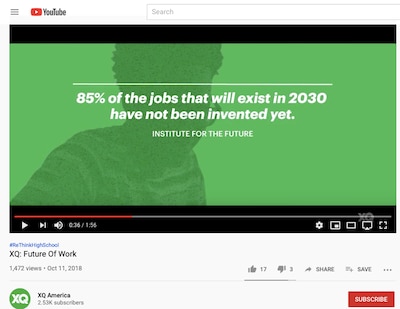Packed in the basement of a branch of the Queens Public Library, roughly 40 New York City educators heard about an exciting opportunity — the chance at major grants to start their own schools or revamp existing ones.
In the background was an unmistakable message. A video showed a classroom with a decrepit chalkboard, then shots of a new car and an iPhone. “So cars are now this, and phones are now this — but high schools are still that?” asked the narrator as the barren blackboard reappeared. “American high schools are based on the same model, and it’s been over 100 years.”
Teachers at the event may not have realized it, but XQ — the deep-pocketed group helping New York City fund the creation and overhaul of a number of city high schools — holds a distinct philosophy about what ails American schools. (XQ is funded by Laurene Powell Jobs’ Emerson Collective, which also funds Chalkbeat through the Silicon Valley Community Foundation.)
It’s an idea that has captured the attention of philanthropists, futurists, business leaders, and politicians of many stripes: that the economy is changing incredibly quickly while public schools are all but frozen in amber.
The evidence for this is not nearly as strong as XQ suggests, though. The world and the economy are changing, of course — post-secondary credentials are more important to getting a high-paying job than they were a generation ago, for example. But there’s also evidence that the rate of change in the economy has actually been slowing, and some economists worry that the economy isn’t moving fast enough.
Meanwhile, XQ has made a few specific claims about the future of work that are misleading or wrong — notable since, in New York City, the education department has accepted not just the organization’s resources but its framework for starting a school. On New York City’s website, those interested in applying for a cut of the $32 million in promised grants are told to explain how their idea will “prepare students for the complexities of a fast-changing future, including the world of work.”
“If schools have failed to adapt to a changing world, then we have a duty to act,” said Jack Schneider, an education historian at the University of Massachusetts Lowell who has been critical of XQ. “Yet how certain are we that the proposed reforms are going to solve the problem?”
The economy is changing, but perhaps not as rapidly as widely believed
The idea that the economy is rapidly evolving seems obvious. Our phones are continually being updated; automated check-out kiosks are proliferating; we keep hearing self-driving cars are around the corner. Some futurists describe the world as being at the onset of the “fourth industrial revolution.” But the evidence for a massive, ongoing economic shift is fairly weak.
In fact, some economists are worried that the rate of economic change is actually slowing. In recent decades, people have been switching jobs less frequently, fewer start-ups have been created, and there has been weaker growth in economic productivity. And contrary to popular belief, there’s little evidence of a rapid rise in the so-called gig economy.
“Yes, we’re seeing change, but compared to past changes, they’re fairly incremental,” said Joel Elvery, an economist with the Federal Reserve Bank in Cleveland, whose own work has found that shifts in occupations have slowed in recent decades.
That hasn’t stopped the narrative that schools need to transform to prepare students for the fast-changing future of work from gaining traction, including among business groups and prominent education leaders, like Education Secretary Betsy DeVos.
To Schneider, predictions about the future of work are useful to advocates because of their ambiguity. “Like the phrase ‘21st century skills,’ it’s as positive sounding as it is meaningless,” he said. “And that makes it a convenient package for almost any reform proposal.”
What is changing? Studies show, and XQ notes, that employers increasingly value interpersonal skills. American society is becoming more racially diverse. College degrees or other credentials are increasingly necessary for high-paying jobs.
And of course, no one can say for sure what the future economy will look like or how rapidly it will evolve. Michele Cahill, a senior advisor at XQ, says the organization’s goals for students — that they will be “holders of foundational knowledge” and “generous collaborators,” among others — will serve them well regardless.
“These kinds of goals are really what appear to both make for a purposeful education for young people, one that engages them in learning … equips them for adult life and for the economy, but also for more than that,” she said.
“You can’t argue that our politics, that our communities are not changing. We have a very complex society that these young people are growing up in.”
A New York City’s education department spokesperson echoed that sentiment. “We have heard directly from communities that education has to keep up with the changes and shifts happening in our world,” said Katie O’Hanlon. “To solve for the problems of tomorrow, students today need a skill set that goes far beyond what was typically expected in the past.”
But XQ has made a few specific, dubious claims about the future (and present) of work
XQ is pitching in $10 million to New York City’s initiative, called Imagine NYC Schools. XQ is also contributing much of the intellectual infrastructure. The application directs educators interested in pitching an idea to consult XQ publications like “Students in the 21st Century,” for example.
“It used to be common for Americans to graduate high school or college, get a job that would sustain a family, and stay in one field for life,” the opening section of that report says. “Nowadays, most people end up working multiple careers by the time they reach age 40.”
XQ cites no evidence to support this claim, and it does not appear to be accurate.
It’s true that young people change jobs more than older people, but that was true in the past, too. Data from the Bureau of Labor Statistics going back decades show the median length of time Americans spend in a given job has held fairly steady.
Other analyses show that workers, especially younger workers, are actually changing jobs less frequently than they used to.
In response to questions from Chalkbeat, XQ was unable to substantiate the claim in its report. A spokesperson pointed to other federal labor data that did just the opposite: While millennials held an average of 7.8 jobs between the ages of 18 and 30, baby boomers held slightly more, 8.2, during the same age range.
XQ has also promoted another future of work canard.

At XQ’s 2018 annual symposium, futurist Heather McGowan repeated a prediction that 65% of the jobs of the future hadn’t been created yet, though she acknowledged that the statistic was “debatable.” A promotional video released by XQ months later made a similar prediction: “Eighty-five percent of the jobs that will exist in 2030 have not been invented yet,” the XQ narrator declared.
But there is no credible analysis to support either number, and the predictions are wildly out of line with historical trends.
The XQ video was removed from YouTube after Chalkbeat inquired about the veracity of this statistic. (It does not appear that XQ has promoted this particular statistic in its published reports.)
When asked about this claim by Chalkbeat, McGowan acknowledged the statistic may not be accurate — “it was a silly, wild-ass guess” — but that it helped drive home her broader point.
“I use it because I need to get people’s attention that some large percentage of work tasks are going to change,” she said. “It really doesn’t matter. I could say 20% … If the provocation comes from a bigger number, fine.”
At the same XQ event, McGowan also claimed that life expectancy would reach 90 years “sometime soon.” Currently, American life expectancy is under 80, and has been inching downward in recent years. Asked about this, McGowan suggested that rapid advances in medicine to treat cancer and heart disease were on the way.
It’s not clear where all this leaves schools
New York City officials have also emphasized the changing world in explaining the Imagine NYC Schools initiative.
“We’re in the middle of massive shifts in society — the economy, the climate. Education needs to keep pace with those shifts and this initiative supports us in doing that,” deputy chancellor Karin Goldmark told Chalkbeat.
For educators in Queens and across New York City, how to design or redesign schools to do that and meet the expectations of both XQ and the city is not obvious. The advice offered is broad, like “Turn school design on its head. Start with your big idea, your vision.”
That is by design, according to XQ. “We’re not specifying a model. It’s not saying, this will do it,” said Cahill. “We’re specifying some design principles and some goals for people to grapple with in their communities.”
Ultimately, the New York City education department says it will decide which school ideas receive funding and which do not. A spokesperson for the department said criteria will include judgments about the school design and “involvement of student and community voice.”
In responses collected by Chalkbeat, some in New York City said the focus should be on more basic needs.
“Our schools need smaller class sizes,” wrote one respondent. “It’s not an innovation, it’s just good practice.”
“Innovation is secondary,” another commented. “First NYC students need everything that students in suburban schools get routinely.”
But others were enthusiastic, embracing the frame encouraged by XQ. “Innovation in schools today looks like making a meaningful connection between schools and the communities in which our students will soon play a more integral role,” wrote one person. “Schools need to update their pedagogy, design, and structure to align with the workforce in 2019.”
Alex Zimmerman contributed reporting.


